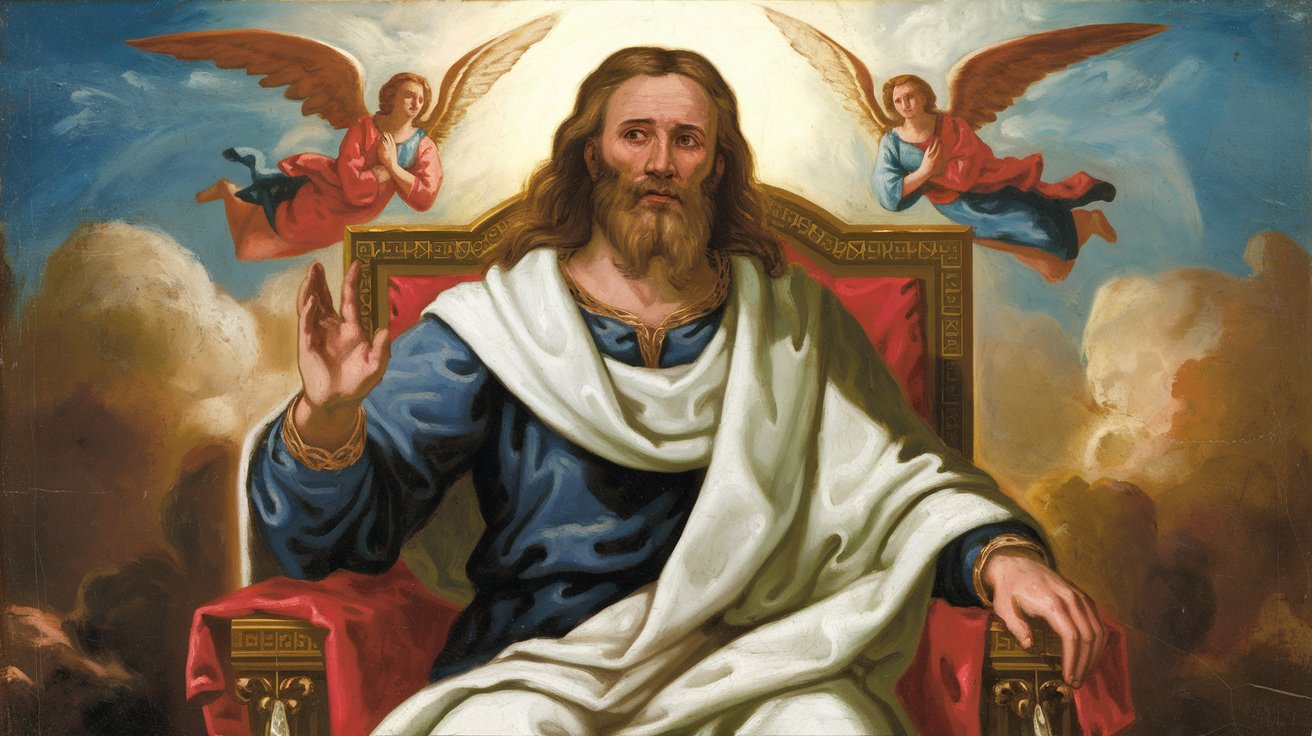
Who or what is the Ancient of Days? The term "Ancient of Days" appears in the Bible, specifically in the book of Daniel. It describes a vision of an eternal, wise figure, often interpreted as God. This concept has deep roots in various religious traditions, especially within Christianity and Judaism. In Christianity, it usually refers to God the Father, emphasizing His timeless nature. Jewish tradition offers a more nuanced view, sometimes linking it to divine figures or high-ranking angels. The Ancient of Days symbolizes eternity, wisdom, and power, making it a significant figure in theology, art, and literature.
Origin and Meaning of Ancient of Days
The term "Ancient of Days" carries deep significance in religious texts and traditions. It is a title that evokes the timeless and eternal nature of the divine.
-
Origin in the Bible: The term "Ancient of Days" comes from the Hebrew Bible, specifically in the book of Daniel (Daniel 7:9-10). Daniel describes a vision where he sees "one like a son of man" coming with the clouds of heaven, and before him, there is "one like the Ancient of Days."
-
Hebrew Translation: In Hebrew, "Ancient of Days" is translated as "Zekur Atik" (זקור אתיק). This phrase combines "zekur," meaning "ancient," and "atik," meaning "of days."
-
Christian Interpretation: In Christian theology, the Ancient of Days is often seen as a reference to God the Father, emphasizing His eternal nature.
-
Jewish Tradition: In Jewish tradition, the Ancient of Days can refer to God or other divine figures, including high-ranking angels. The Talmud discusses multiple "Ancients of Days" in different contexts.
-
Islamic Perspective: While there is no direct equivalent in Islamic theology, the Quran describes Allah as the "Eternal" (al-Qadim) and the "Self-Sufficient" (al-Qayyum), highlighting His eternal nature.
Historical and Cultural Context
Understanding the historical and cultural backdrop helps us appreciate the significance of the Ancient of Days.
-
Historical Context: The term "Ancient of Days" in Daniel 7:9-10 was written during the Babylonian exile, a period when the Jewish people sought to understand their relationship with God and the future of their nation.
-
Symbolism: The Ancient of Days symbolizes eternity, wisdom, and power. The image of an old man with white hair and a beard represents wisdom and age, emphasizing God's infinite knowledge.
-
Artistic Depictions: Throughout history, the Ancient of Days has been depicted in various forms of art. In medieval Christian art, He is often shown as an elderly man with a long white beard and hair, seated on a throne.
-
Liturgical Significance: In many Christian traditions, the Ancient of Days is invoked in prayers and hymns to emphasize God's eternal nature and wisdom.
-
Theological Debates: Scholars have debated the interpretation of the Ancient of Days. Some argue it refers specifically to God the Father, while others see it as a more general term for divine wisdom or power.
Influence on Literature and Art
The concept of the Ancient of Days has left a lasting impact on literature and art, enriching cultural expressions.
-
Influence on Literature: John Milton's epic poem "Paradise Lost" describes God as the Ancient of Days, emphasizing His eternal nature and wisdom.
-
Influence on Art: William Blake's famous painting "The Ancient of Days" depicts God as an old man with a compass, symbolizing His role in creating and governing the universe.
-
Cultural Significance: The Ancient of Days serves as a reminder of the eternal and unchanging nature of God, providing comfort and reassurance in times of uncertainty.
-
Interfaith Dialogue: The concept can be used in interfaith dialogue to highlight common themes across different religious traditions, such as the idea of an eternal and wise deity.
-
Historical Development: The concept has evolved over time, reflecting the historical and cultural context in which it was written and interpreted.
Philosophical and Theological Implications
The Ancient of Days raises profound philosophical and theological questions about time, eternity, and the nature of existence.
-
Philosophical Implications: It raises questions about time, eternity, and existence, underscoring the importance of wisdom and knowledge in understanding the divine.
-
Theological Consistency: Different interpretations must be evaluated against the broader theological framework of each faith tradition to ensure consistency.
-
Scriptural Context: Understanding the scriptural context is essential. The passage in Daniel 7:9-10 must be read within the broader narrative of the book of Daniel and the Hebrew Bible.
-
Historical Figures: Figures like Daniel and other prophets played significant roles in shaping the concept of the Ancient of Days through their visions and writings.
-
Cultural Influences: Cultural perceptions of wisdom and age have influenced the depiction of the Ancient of Days, especially in medieval Christianity.
Symbolism and Attributes
The Ancient of Days embodies various attributes that highlight the divine nature of wisdom, power, and eternity.
-
Symbolic Language: The use of symbolic language in describing the Ancient of Days conveys complex theological ideas in a poetic and meaningful way.
-
Eternal Nature: The eternal nature of the Ancient of Days emphasizes that God is beyond time and has no beginning or end, a concept fundamental to many religious traditions.
-
Wisdom and Knowledge: Attributes of wisdom and knowledge highlight God's infinite understanding and ability to guide humanity through life's challenges.
-
Power and Authority: The power and authority of the Ancient of Days underscore God's ability to govern the universe and bring about justice and righteousness.
-
Divine Providence: The concept suggests that God is actively involved in guiding human affairs and ensuring that justice prevails.
Practical and Spiritual Relevance
The Ancient of Days offers moral guidance, spiritual comfort, and educational value, making it relevant in various aspects of life.
-
Moral Guidance: The Ancient of Days sets standards for human behavior, encouraging people to live virtuous lives and seek wisdom from divine sources.
-
Spiritual Comfort: The idea offers spiritual comfort during times of uncertainty or hardship, reminding believers that God is always present and guiding them.
-
Interpretive Flexibility: Different interpretations can coexist within a faith tradition, each offering unique insights into the nature of God.
-
Theological Evolution: New interpretations and insights have emerged as religious traditions have developed, shaping our understanding of the Ancient of Days.
-
Cultural Relevance: The concept continues to influence art, literature, and theology, serving as a powerful symbol of divine wisdom and power.
Educational and Liturgical Significance
The Ancient of Days serves as a valuable teaching tool and holds liturgical importance in many religious practices.
-
Historical Contextualization: Understanding the historical context in which this concept emerged helps clarify its meaning and significance.
-
Philosophical Debates: Ongoing philosophical debates surround the Ancient of Days, discussing time, eternity, and the nature of existence.
-
Liturgical Practices: Prayers, hymns, and rituals often invoke the Ancient of Days to emphasize God's eternal nature and wisdom.
-
Educational Significance: The concept serves as a valuable teaching tool for understanding complex theological ideas in an accessible and meaningful way.
-
Cultural Impact: The Ancient of Days has left a lasting impact on various cultural expressions, enriching our understanding of divine wisdom and power.
Timeless Wisdom and Eternal Power
The Ancient of Days concept is a rich tapestry woven through various religious traditions. Originating in the Hebrew Bible, it paints a picture of a deity embodying eternity, wisdom, and power. Whether seen as God the Father in Christianity, a nuanced figure in Judaism, or echoed in the eternal nature of Allah in Islam, this idea resonates deeply. Artistic depictions, from medieval Christian art to William Blake's paintings, capture its profound symbolism. Theological debates and philosophical musings continue to explore its depths, while its influence on literature and culture remains undeniable. The Ancient of Days offers spiritual comfort, moral guidance, and a reminder of the divine's unchanging nature. Understanding this concept enriches our grasp of divine wisdom and eternal power, making it a timeless cornerstone in human spirituality.
Was this page helpful?
Our commitment to delivering trustworthy and engaging content is at the heart of what we do. Each fact on our site is contributed by real users like you, bringing a wealth of diverse insights and information. To ensure the highest standards of accuracy and reliability, our dedicated editors meticulously review each submission. This process guarantees that the facts we share are not only fascinating but also credible. Trust in our commitment to quality and authenticity as you explore and learn with us.

